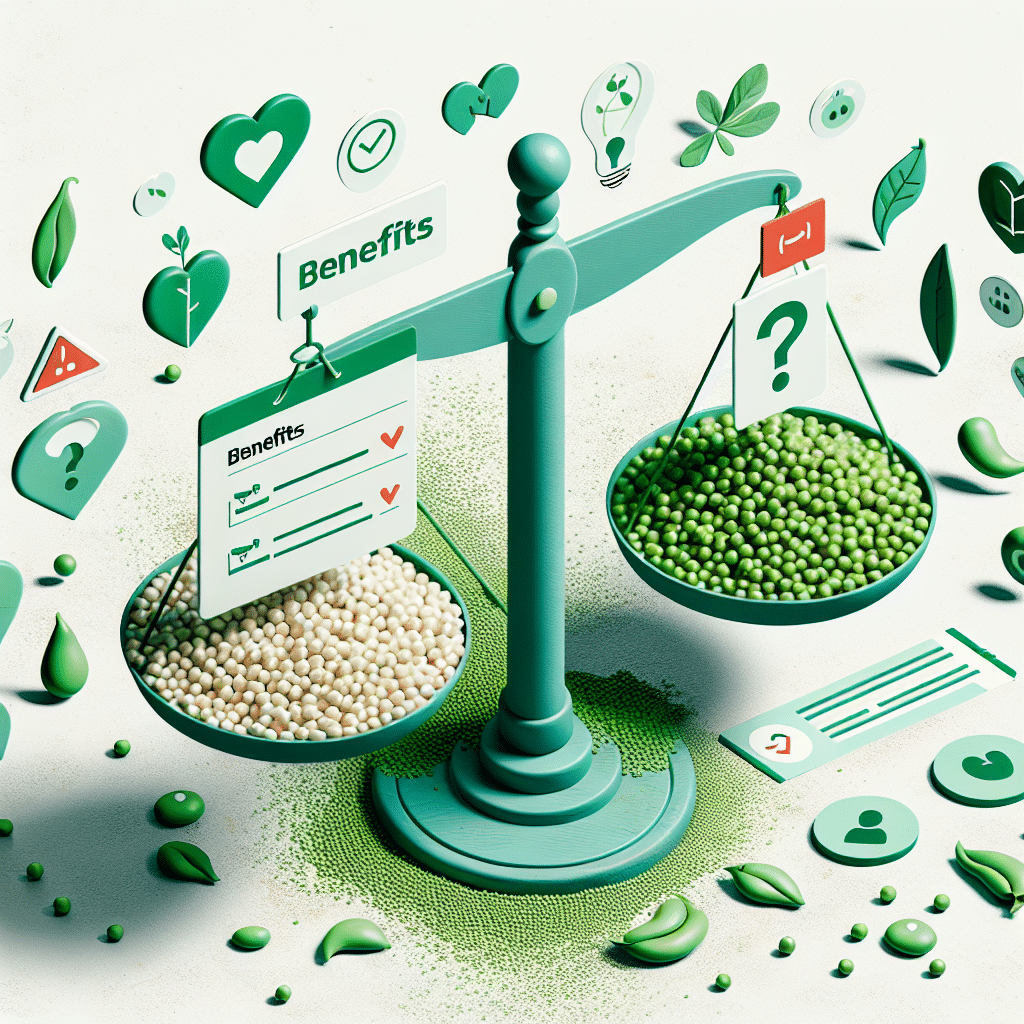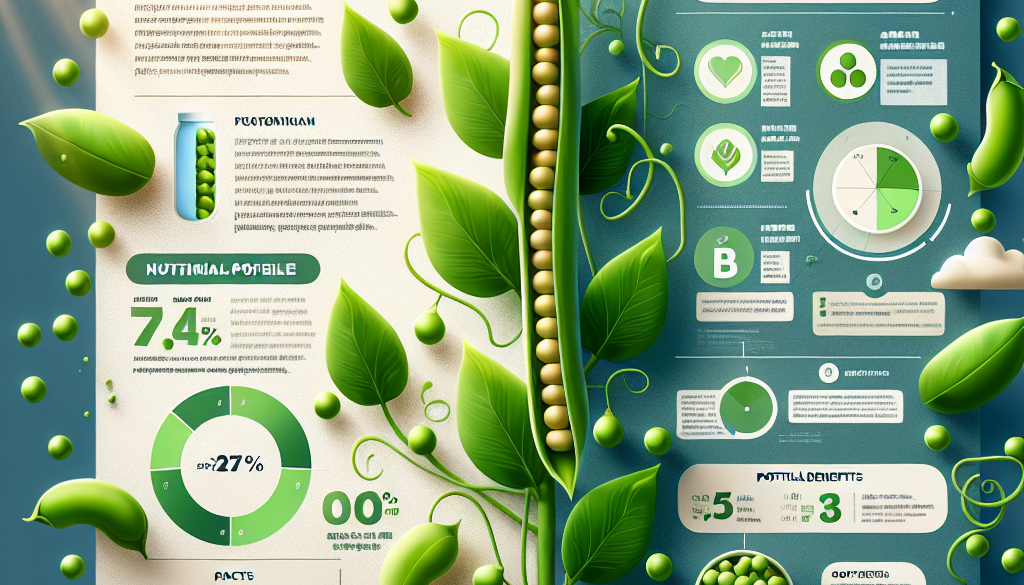Is Pea Protein Bad for You: Health Facts
-
Table of Contents
Is Pea Protein Bad for You: Health Facts

Pea protein has gained significant popularity in recent years as a plant-based alternative to animal-based protein sources. With the rise of veganism and the increasing demand for sustainable food options, pea protein has become a go-to choice for many health-conscious individuals. However, there have been concerns and debates about whether pea protein is actually good for your health. In this article, we will explore the health facts surrounding pea protein and determine whether it is truly beneficial or potentially harmful.
What is Pea Protein?
Pea protein is derived from yellow split peas, a type of legume. It is a high-quality protein source that contains all nine essential amino acids, making it a complete protein. Pea protein is also naturally free of cholesterol, gluten, and dairy, making it suitable for individuals with specific dietary restrictions or allergies.
The Benefits of Pea Protein
1. Muscle Building and Recovery: Pea protein is rich in branched-chain amino acids (BCAAs), which are essential for muscle growth and repair. Studies have shown that pea protein can be just as effective as whey protein in promoting muscle protein synthesis and enhancing muscle recovery after exercise.
2. Weight Management: Pea protein is low in calories and high in protein, making it an excellent choice for individuals looking to manage their weight. Protein has been shown to increase satiety and reduce appetite, leading to a decreased calorie intake throughout the day.
3. Heart Health: Pea protein is cholesterol-free and low in saturated fat, making it a heart-healthy protein option. High cholesterol levels and saturated fat intake are associated with an increased risk of heart disease. By incorporating pea protein into your diet, you can help maintain healthy cholesterol levels and reduce the risk of cardiovascular problems.
4. Digestive Health: Pea protein is easily digestible and does not contain common allergens such as gluten and dairy. This makes it a suitable protein source for individuals with sensitive digestive systems or food intolerances.
Potential Concerns about Pea Protein
While pea protein offers numerous health benefits, there are a few potential concerns that should be taken into consideration:
1. Allergies: Although pea protein is naturally free of common allergens, some individuals may still be allergic to peas. It is important to be aware of any potential allergies or sensitivities before incorporating pea protein into your diet.
2. Heavy Metal Contamination: Some studies have found traces of heavy metals, such as lead and arsenic, in certain pea protein products. These contaminants can be harmful to human health if consumed in large quantities. It is crucial to choose pea protein products from reputable brands that prioritize quality control and regularly test for heavy metal contamination.
3. Digestive Issues: While pea protein is generally well-tolerated, some individuals may experience digestive issues such as bloating, gas, or stomach discomfort. This can be due to the high fiber content in pea protein or individual differences in digestion. If you experience any digestive issues, it is recommended to start with a smaller serving size and gradually increase it to allow your body to adjust.
Choosing High-Quality Pea Protein
When selecting pea protein products, it is essential to choose high-quality options that prioritize purity and safety. Here are a few factors to consider:
- Look for products that are certified organic and non-GMO to ensure that no harmful pesticides or genetically modified ingredients are present.
- Check for third-party testing and certifications to verify the product’s quality and safety standards.
- Read customer reviews and testimonials to gauge the overall satisfaction and effectiveness of the product.
- Consult with a healthcare professional or registered dietitian to determine the appropriate serving size and ensure that pea protein is suitable for your individual needs and health goals.
Summary
Pea protein is a nutritious and versatile plant-based protein source that offers numerous health benefits. It is a complete protein, rich in essential amino acids, and can support muscle building, weight management, heart health, and digestive health. However, it is important to be aware of potential allergies, heavy metal contamination, and digestive issues that may arise. By choosing high-quality pea protein products and consulting with a healthcare professional, you can safely incorporate pea protein into your diet and enjoy its many health benefits.
About ETprotein:
ETprotein, a reputable pea protein and rice protein Chinese factory manufacturer and supplier, is renowned for producing, stocking, exporting, and delivering the highest quality organic bulk vegan protein and plant proteins. They include Organic rice protein, clear rice protein, pea protein, clear pea protein, pumpkin seed protein, sunflower seed protein, mung bean protein, etc. Our offerings, characterized by a neutral taste, non-GMO, allergen-free attributes, cater to a diverse range of industries. We serve nutraceutical, pharmaceutical, cosmeceutical, veterinary, as well as food and beverage finished product distributors, traders, and manufacturers across Europe, USA, Canada, Australia, Thailand, Japan, Korea, Brazil, and Chile, among others.
Our specialization includes exporting and delivering tailor-made protein powder and finished nutritional supplements. Our extensive product range covers sectors like Food and Beverage, Sports Nutrition, Weight Management, Dietary Supplements, Health and Wellness Products, and Infant Formula, ensuring comprehensive solutions to meet all your protein needs.
As a trusted company by leading global food and beverage brands and Fortune 500 companies, ETprotein reinforces China’s reputation in the global arena. For more information or to sample our products, please contact us and email sales(at)ETprotein.com today.












